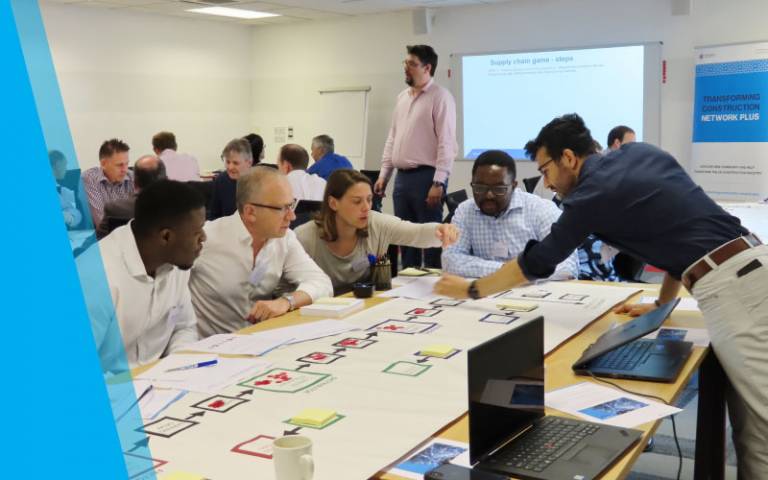Tackling the Construction Challenge with supply chain management
7 August 2019
Opening its community to new perspectives, the Transforming Construction Network Plus explored supply chain management during its second Discovery Day.

The Transforming Construction Challenge sets out to address the challenges of stakeholder fragmentation and complexity facing the construction industry. The adoption of principles of the manufacturing industries, such as supply chain management, are held out as offering substantial benefits for the construction sector.
For example, improved supply chain integration could bring a better visibility of planned demand from customer to supplier, creating certainty and allowing for supplier investments in their production. Such integration also helps to align stakeholder interests, stimulating long-term alliances, leading, in turn, to a more efficient management of material and information flow.
To consider this question, the Transforming Construction Network Plus (N+) held a second Discovery Day Managing Supply Chains for Success on Thursday 27 June at WMG, University of Warwick.
This interdisciplinary event brought together 30 academics and industry representatives, and provided the attendees with a new insight on how supply chain integration could boost the UK construction industry. Participants heard about the relevance of WMG’s cutting-edge supply chain research, and explored their Automated Manufacturing, Battery and Connected Autonomous Vehicle (CAV) to understand better how new technologies have the potential to transform construction supply chains.
Value of supply chain integration
To demonstrate the importance of supply and demand management in a project, the attendees took part in a facilitated “Beer Game”. Dr Mark Johnson guided participants through the business simulation game, during which they experienced typical supply chain coordination problems that highlighted the importance of supply chain integration, visibility and communication.
Economies of repetition and demand segmentation
When effectively applied, supply chain integration can be a vehicle to innovation. Prof Jan Godsell described the value and importance of economies of repetition in the supply chain delivering the certainty that supports innovation. Profiling and grouping the value drivers of projects at a portfolio level was highlighted as a key factor in fostering effective and value-adding project delivery. Echoing this point, Christine McNeill told participants that demand segmentation helps to identify and differentiate companies’ repeatable and more unpredictable demand. She supported her arguments with a WMG case study from construction, showcasing SupplyVue’s digital supply chain ecosystem.
Unite digital and supply chain integration
Adopting digital technologies to enhance supply chain effectiveness introduces new considerations. Hugh Boyes discussed how the digital transformation of supply chains requires a focus on data quality, security and robust information management. When delivered together, these factors will support organisations in making the right decisions within a supply chain.
The role of alliances and collaborations
Construction project delivery depends upon the collaboration of a large and diverse number of partners. Nigel Blundell highlighted to attendees the critical role that contracts play in enabling supply chain integration, and how a fair allocation of risks and opportunities among the project participants can facilitate better project interactions, and ultimately positive project outcomes.
The attendees concluded the day by reflecting on new perspectives and co-creating new ideas to take away with them. In groups, they discussed and identified the factors that inhibit supply chain integration in construction, how they might be mitigated, and the steps that they would each be taking to transform construction in their work.
 Close
Close


